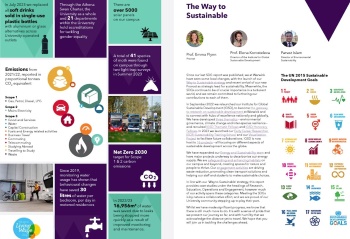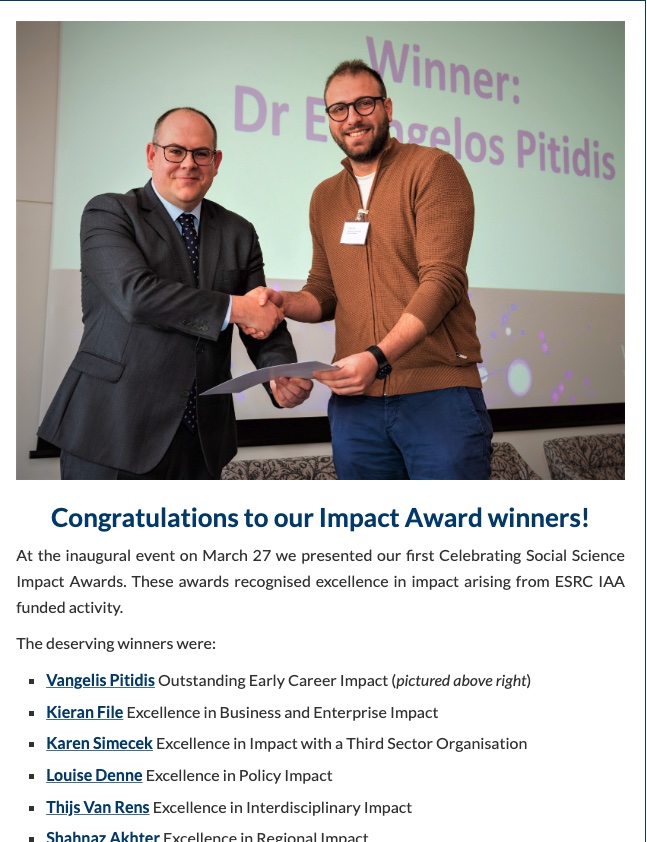IGSD News
Warwick's Report on Sustainable Development Goals - Nov23
 In line with our ‘Way to Sustainable’ strategy, this report provides case studies under the headings of Research, Education, Operations and Engagement, however much of our activity spans these categories. Meeting the SDGs is by nature a collaborative effort, and we are proud of our University community stepping up to play their part.
In line with our ‘Way to Sustainable’ strategy, this report provides case studies under the headings of Research, Education, Operations and Engagement, however much of our activity spans these categories. Meeting the SDGs is by nature a collaborative effort, and we are proud of our University community stepping up to play their part.
As part of the report you can also read about IGSD researchers' effort to contribute to sustainable development. E.g. you can find information there about Heri's and Feng's research, and a wider reference to all our projects.
Please read the full report here: https://warwick.ac.uk/sustainability/what-we-are-doing/strategy/performance-reporting/un_sustainable_development_goals_report_2022-23.pdf
Horizon Europe SHAPEDEM-EU annual progress meeting in Krakow
Horizon Europe SHAPEDEM_EU project, launched in October 2022, has had its first annual in-person meeting in Krakow on 9-11 October 2023. The meeting brought together 12 institutional members of the consortium, to share and discuss knowledge co-production by different Work-Packages (WPs), and to engage with the EU officials on the developments in the EU neighbourhoods. In particular, Warwick team leading WP2 on assessing democracy promotion in the eastern neighbourhood, engaged with WP1 - the conceptual framework of the project - and discussed the progress and challenges for WP2 in undertaking fieldwork in Eastern Europe and capturing perceptions and practices of democracy on ground, covering Belarus, Ukraine, Moldova, and the Caucasus - the countries affected by war, conflict, and internal/external oppression.
Celebrating Research Impact with IGSD
Celebrating Impact once again @uniofwarwick! Impact Newsletter Summer 2023 reminded us that @IGSD_UoW makes a strong impact across the board: Warm congrats to Dr Vangelis Pitidis once again for making a difference in the world as an Early Career Researcher!
EWIS conference: Dr Kudlenko presented a paper on resilience in Ukraine
At EWIS conference in Amsterdam Dr Kudlenko presented a paper on resilience in Ukraine as part of Horizon 2020 SHAPEDEM project. Dr Kudlenko used the findings from her Resilience and War project on Ukraine, as well as secondary data analysis as part of the Shapedem.

ECR STS - huge success!
Last week we had our first ever ECR Sustainability Training School at Warwick! It has been a huge success, thanks to all the support we had received and our participants!
The ECR STS brought together participants from 26 countries, of different age, religion, philosophy, and discipline - embodying the very spirit of future solutions to sustainable development for a more resilient world. The participants enjoyed a great hospitality that only Warwick can offer 😉, including the weather! They also shared their individual research, with in-depth feedback, and learned to work together through team-building skills and group projects. They were exposed to innovative methods, public and policy engagement; and enjoyed their sustainability trails, and engagement with sustainability champions and strategic partner-networks. Team IGSD - well done - you rock!
#research #sustainabledevelopment #training #EarlyCareerResearchers #IGSD #EUTOPIA #MONASHAlliance #TheGUILD #UNSDSN UK

